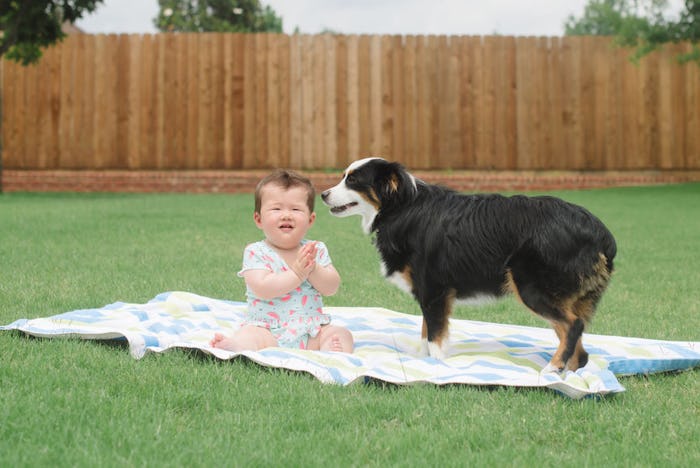Life

The Reason Why Babies Screech At Animals Is So Relatable
I know my beagles have entered the room long before I see them. And no, they actually don’t bark to announce their presence (believe it or not), but my 1-year-old does. Well, he doesn't bark, exactly, but he screeches so loud to announce the arrival of his pets my that my ears ring (poor doggos). And it's not just our pups; my son also screeches at every dog, bird, and squirrel we encounter on our walks, as well as our two cats. This habit of his has me wondering, why do babies screech at animals? Is he just excited to see them? Is he trying to communicate with nature? What’s going on in his baby brain?
Dr. Gina Posner, a pediatrician at MemorialCare Orange Coast Medical Center in Fountain Valley, California, tells Romper in an email interview that this reaction is “likely due to excitement.” (Surprise!)
“Since they can’t speak yet, they show excitement by screeching,” she explains. Dr. S. Daniel Ganjian, a pediatrician at Providence Saint John’s Health Center in Santa Monica, California, concurs, elaborating, “Babies communicate in different ways, sometimes through crying, grunting, coughing (as long as they are also not sick), and screeching."
"Animals can excite a baby, especially if the animals are moving or wagging their tails," he says.
"When babies get very excited, they cannot say, ‘I am so excited.’ Rather, they show their excitement by screaming and screeching. Once you realize why they are screeching, you won't be so alarmed and annoyed,” he tells Romper.
If you happen to have a headache or your dog can't handle the shrill shouting or you just want to spare those around you on your walk the high-decibel squirrel greetings, Ganjian offers a solution on how to curb this behavior. “How do you curb any unwanted behavior? By training your baby,” Ganjian says.
“Tell your child that we have to be quiet and then make a shush sound while putting your finger in front of your mouth. Smile as your child interacts quietly with the animal. When they screech, make a sad face and say ‘no.’ Sometimes you have to remove the animal each time your baby screeches. After about 6 to 10 times of such behavior, your baby will learn that screeching makes mommy or daddy sad and makes the animal disappear, but being happy brings a smile to their parents’ faces. Sometimes you might have to wait until your child is a little older before re-exposing him to an animal.” However, Posner adds that it may be difficult to curb their enthusiasm.
So babies are just pretty darn excited to see animals. Hell, I’m pretty darn excited to see animals myself. That’s why I’m always the person in the car who yells, “Cows!” whenever we drive by some cows, or “Dog!” whenever I see someone walking their dog. When they screech, babies are just doing the equivalent. If it bothers you, just shush them gently, remove the animal and make a sad face. If your baby is quiet around the animal, smile and tell them good job. They’ll figure out what makes you happier and what keeps the animal around for them to explore and admire.
This article was originally published on